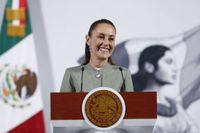On April 4, 2025, President Claudia Sheinbaum defended the government’s initiative ‘Chocolate Bienestar’ during her morning press conference, addressing criticisms regarding warning labels placed on the product for excess sugar, calories, and saturated fats. Sheinbaum emphasized that despite these labels, the chocolate contains "menos azúcar" (less sugar) than many commercial chocolates, asserting its higher cacao content makes it a healthier option.
During her remarks, Sheinbaum acknowledged the necessity of the warning labels, stating, "Se le tiene que poner porque así está la norma" (It has to be put on because that’s what the norm requires). However, she insisted that the amount of sugar in ‘Chocolate Bienestar’ is minimal compared to that found in other processed chocolates available in stores.
Maria Luisa Albores, the director of Alimentación para el Bienestar, also spoke about the product, announcing that it will be available in three formats: de mesa (table chocolate), en barra (bar chocolate), and en polvo (powdered chocolate). Albores explained that the chocolate is designed to cater to various consumer needs, particularly for preparing milk beverages.
Sheinbaum's defense of ‘Chocolate Bienestar’ comes amid a broader discussion about food health standards in Mexico, particularly concerning children’s diets. She criticized a recent judicial decision that temporarily suspended a ban on junk food sales in schools, stating, "No debería ser" (It should not be). She called for parents and educational authorities to prioritize healthy eating for children, reinforcing the idea that the right to health, as guaranteed by Article 4 of the Mexican Constitution, should be a priority in public policy.
In addition to addressing the chocolate initiative, Sheinbaum highlighted the government’s commitment to achieving food sovereignty. The Mexican government announced an investment of 83,760 million pesos (approximately 4.2 billion dollars) aimed at benefiting 750,000 agricultural producers by 2030. This year alone, the investment is set to reach 53,971 million pesos (about 2,698.5 million dollars), assisting 300,000 farmers.
Julio Berdegué, the Secretary of Agriculture and Rural Development, outlined ambitious goals to boost agricultural production by 2030. The targets include increasing corn production by 17% to reach 25 million tons, bean production by 64% to achieve 1.2 million tons, and doubling rice production to 450,000 tons. Additionally, milk production is projected to grow by 15% to 15 billion liters by the end of the decade.
Berdugué stated, "Las metas que nos ha planteado nuestra presidenta son ambiciosas, pero son posibles de lograr" (The goals set by our president are ambitious, but they are achievable). He expressed confidence that with proper support, small producers in Mexico can significantly contribute to national food security.
The ‘Chocolate Bienestar’ initiative is part of a broader strategy to promote local produce and strengthen the social economy in Mexico. The chocolate, made with Mexican cacao, aims to highlight the value of domestic agriculture and differentiate itself from heavily processed commercial brands. According to official statements, its formulation includes a higher cacao content than other industrialized chocolates, although the presence of sugar has sparked controversy due to the warning labels on its packaging.
Currently, ‘Chocolate Bienestar’ is available primarily through government-linked distribution points and programs aimed at supporting local producers. Reports indicate that a bar of this chocolate costs between 20 and 30 pesos, making it accessible to the general public and competitive with commercial chocolates.
Despite the government’s efforts to promote ‘Chocolate Bienestar’, questions about its health implications linger. The product carries warning labels indicating it contains sugar, which must be reported to consumers as per regulations. However, there have been no recent independent studies to thoroughly evaluate its health impact. Nutrition experts suggest that while moderate consumption of high-cacao chocolate can offer benefits, the added sugar remains a concern, particularly in a country grappling with high obesity and diabetes rates.
Sheinbaum has acknowledged the real issues of obesity and diabetes, advocating for reduced sugar consumption overall. However, she has not explicitly discouraged moderate consumption of ‘Chocolate Bienestar’. Instead, she reiterated its potential as a healthier alternative, stating, "Lleva un poco de azúcar, por eso tiene que tener los sellos, pero tiene un contenido de cacao mayor al procesado" (It has a little sugar, which is why it has to have the labels, but it has a higher cacao content than processed chocolates).
As the ‘Chocolate Bienestar’ initiative continues to develop, it stands as a reflection of the Mexican government’s efforts to address public health concerns while supporting local agriculture. The balance between promoting healthier options and managing the implications of sugar consumption remains a critical conversation in the ongoing dialogue about nutrition in Mexico.







